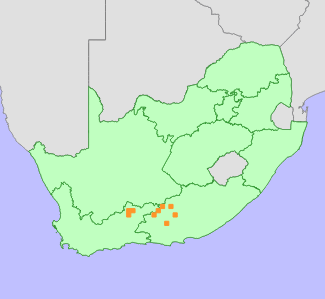|
Scientific Name | Delosperma concavum L.Bolus |
Higher Classification | Dicotyledons |
Family | AIZOACEAE |
National Status |
Status and Criteria | Least Concern |
Assessment Date | 2019/10/22 |
Assessor(s) | D. Raimondo |
Justification | Delosperma concavum has a restricted distribution range, with an extent of occurrence (EOO) of 13 893 km². It is however a common species with no severe threats, and therefore it is not in danger of extinction at present. There is a small possibility that it may become threatened in future if planned shale gas extraction is to go ahead, but at present this seems unlikely. It is listed as Least Concern. |
Distribution |
Endemism | South African endemic |
Provincial distribution | Eastern Cape, Western Cape |
Range | This species is endemic to South Africa, and occurs in the Nuweveld and Sneeuberg mountains between Beaufort West and Graaff-Reinet. |
Habitat and Ecology |
Major system | Terrestrial |
Major habitats | Upper Karoo Hardeveld |
Description | It occurs in flats and plateaus with open karroid shrubland and grassland. |
Threats |
| A small proportion of this species' range falls within an area earmarked for shale gas extraction. A Strategic Environmental Impact Assessment submitted to South Africa's Department of Environment Affairs in 2016 cautioned against the authorisation of shale gas fracking, based on the very high infrastructure costs associated with fracking as well as multiple secondary negative impacts both to biodiversity and other economic activities in the region. Furthermore, subsequent geological studies found that gas deposits are not as substantial as originally suspected, due to the very old age of the Karoo shale formations, and the effect of widespread dolerite intrusions that resulted in much of the gas being lost. At present, future development scenarios are too uncertain to estimate the potential extent of the impact on the population but it is unlikely that shale gas fracking will proceed in the near future. |
Population |
There are many recent observations of Delosperma concavum, indicating that it is common within its habitat. The population is not suspected to be declining.
|
Population trend | Stable |
Assessment History |
Taxon assessed |
Status and Criteria |
Citation/Red List version | | Delosperma concavum L.Bolus | Least Concern | Raimondo et al. (2009) | |
Bibliography |
Bolus, H.M.L. 1928-1935. Notes on Mesembrianthemum and allied genera. Part II. Bolus Herbarium, University of Cape Town, Cape Town.
Bredenkamp, C. In prep. Conspectus of the flora of the Eastern cape. Strelitzia.
Raimondo, D., von Staden, L., Foden, W., Victor, J.E., Helme, N.A., Turner, R.C., Kamundi, D.A. and Manyama, P.A. 2009. Red List of South African Plants. Strelitzia 25. South African National Biodiversity Institute, Pretoria.
|
Citation |
| Raimondo, D. 2019. Delosperma concavum L.Bolus. National Assessment: Red List of South African Plants version 2024.1. Accessed on 2025/12/08 |
 Comment on this assessment
Comment on this assessment


